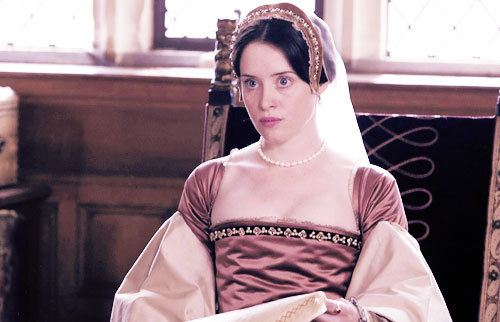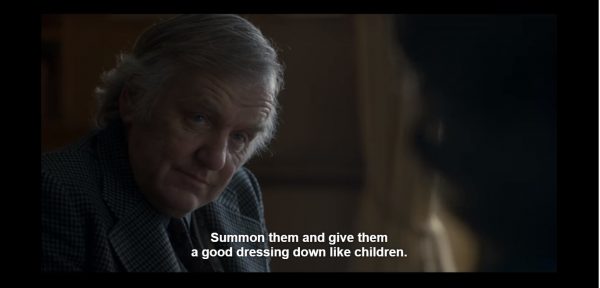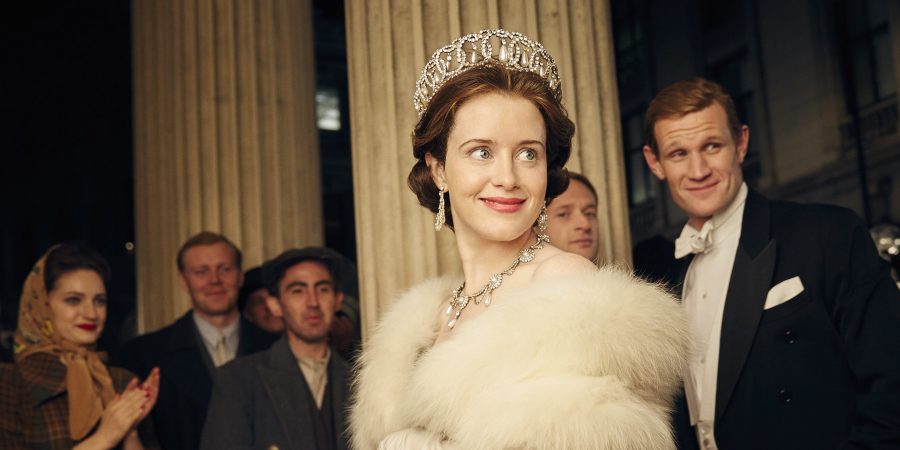Editor’s note: Claire Foy has won her first Emmy – Outstanding Lead Actress In A Drama Series – for her role as Queen Elizabeth II in the Netflix drama The Crown. The actress was nominated in 2017 too under the same category, but the award eventually went to Elizabeth Moss for The Handmaid’s Tale. Here’s a review of the series from last year.
One of the most powerful moments in The Crown – a biographical drama of the British royal family, especially of Queen Elizabeth – arrives in episode 7. Winston Churchill (John Lithgrow), in an audience with the newly crowned Queen Elizabeth (a brilliant Claire Foy), talks world politics. He tells her that he’s just received confirmation about the Soviets testing the H-Bomb in the Kazhakh desert. Amidst some preening (“I’m the person everyone would want in the room with Stalin”) and foisting his opinions on the young – and yet unschooled in affairs of the world — Queen, Churchill forcefully declares that Britain must spearhead the efforts to secure peace, lest Eisenhower beats them to it. Elizabeth is lost, and Churchill, sensing that, presses his advantage. And when says that he’d shortly dispatch the Foreign Secretary (Jeremy Northam as Anthony Eden) to Washington to secure a meeting with Eisenhower, Elizabeth swiftly pounces on something that she has sure knowledge of. Is he up to it, she asks, momentarily stumping the very verbose Churchill — “I’ve heard he is a very sick man. I would hate to think that the country wasn’t in safe hands.”
The Crown, Netflix’s home production and its most expensive series to date, is made of many such coming-of-age moments in the life of the young Queen Elizabeth II. When it begins, The Crown seems like an organic extension of The King’s Speech, a 2010 movie that was set around King George VI’s ascension to the throne, with particular focus on the King overcoming his speech disorder, with the help of a therapist found by his wife and queen-consort, Lady Elizabeth, later the Queen Elizabeth the Queen Mother.
Having already won two Emmys – one for production design and for period costumes – The Crown’s nomination for the Best Drama Series, is not without merit. The series, while drawing largely on its principal character, also delves intimately into the psyche of several others. It explores the quandary that the Queen feels when torn between her sister’s happiness, and duty to the Church; the camera passes, as if in stealth, over many moments of love between Margaret and Captain Peter Townsend, and in a particular frame, the Princess – engaged in one of her wild parties — tellingly closes the door on us, as Alan ‘Tommy’ Lascelles (Pip Torrens), the Queen’s Private Secretary (and the unofficial party pooper) looks on chagrined.
Churchill, brought to life perfectly by Lithgrow (also nominated for Best Supporting Actor), is also deconstructed, episode by episode – the man who shields his frailty from the world, and the Queen, and who gets distraught and burns a portrait that shows his likeness – as that of a hunched, elderly man.

If there’s something that The Crown does particularly well, it is the brilliant casting. Claire Foy, who had previously played Anne Boleyn in the BBC mini-series Wolf Hall, slips into the very vintage gowns of the Queen Elizabeth, and perfectly mirrors her young self, right down to the enunciation, and the subtle inflections in her voice. Foy, as a demure, naive Queen is particularly striking after her role as the powerful, authoritative and raw Anne Boleyn, so open with her emotions, and who had exerted a great influence over Henry VIII, and was instrumental in his fallout with the Papacy.
Season one of The Crown traverses the first decade of the Queen’s reign, at the end of which the initially restrained and shy Foy, who only looks from underneath her lashes, is seen with a steely glint in her eye as she stamps out the flames of romance between her sister and Captain Peter Townsend. Vanessa Kirby as the wild and impulsive Princess Margaret, who veers between sorrow and joy, her emotions heavily riding on her sister’s decisions, is right out a picture book of the Windsors. Also sneaked in there is a rather soulful portrait of Edward VIII, who abdicated the throne to marry Wallis Simpson, and who, reviled by the rest of the royal family, becomes something of an advisor and confidante to the Queen. Alex Jennings, who essays the role of Edward VIII, effectively conveys the divisive emotions that course through him – as a former King who had to renounce all for love, and who still harbours a little something for the throne.
At the heart of the season, is the little family that the Queen tries to make for herself; a dissatisfied, and a perennially pouty husband who, just like Edward VIII, had to give up his titles, deal with snooty royalty, have his whims sanctioned by the Cabinet, and perhaps the most prickly of all, bend the knee to his wife. Philip, as portrayed by Matt Smith, is a fascinating piece of work, who constantly tries to influence his wife’s decisions, only to be told off by the Cabinet, or his wife herself – the woman who has now grown to fit the shoes of her father.
 Indeed, towards the end of the season, after a gentle push from her tutor (“they are English, upper class and male, a good dressing down from Nanny is what they need the most in life”) she calls Churchill in, and admonishes him. She tells him that it’s a betrayal of trust, especially that of the institutions that they both represent, for not having told her about his sickness. The camera here, stares at Elizabeth from the perspective of Churchill. It looks down at her, in quiet surprise. She picks up her handbook of the constitution, the one from her childhood, reads out the lines. And when she questions her Prime Minister – the one who led Britain through the World War II – and tells him to consider his response, “in light of the respect that her rank and office deserve and not that which her age and gender might suggest,” Lithgrow as Churchill – in a moment of superb enactment – having worn two ‘blobs’ on his back teeth to render the Churchill jowls, cowers visibly.
Indeed, towards the end of the season, after a gentle push from her tutor (“they are English, upper class and male, a good dressing down from Nanny is what they need the most in life”) she calls Churchill in, and admonishes him. She tells him that it’s a betrayal of trust, especially that of the institutions that they both represent, for not having told her about his sickness. The camera here, stares at Elizabeth from the perspective of Churchill. It looks down at her, in quiet surprise. She picks up her handbook of the constitution, the one from her childhood, reads out the lines. And when she questions her Prime Minister – the one who led Britain through the World War II – and tells him to consider his response, “in light of the respect that her rank and office deserve and not that which her age and gender might suggest,” Lithgrow as Churchill – in a moment of superb enactment – having worn two ‘blobs’ on his back teeth to render the Churchill jowls, cowers visibly.
That perhaps, is what I’d call perfectly dramatic and entirely uplifting.
*****
Featured image: Wired.com



